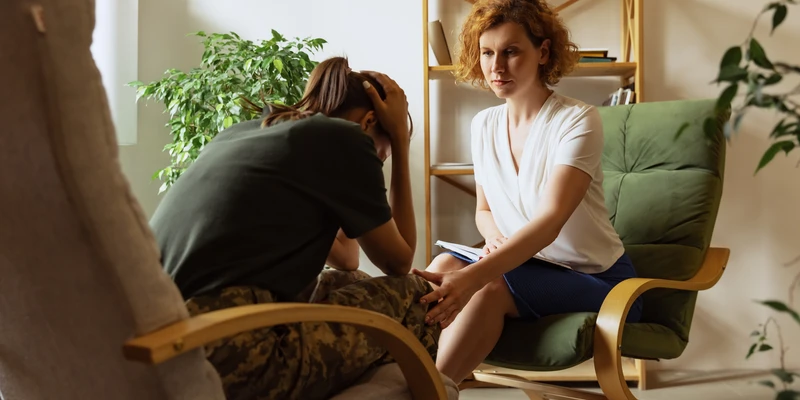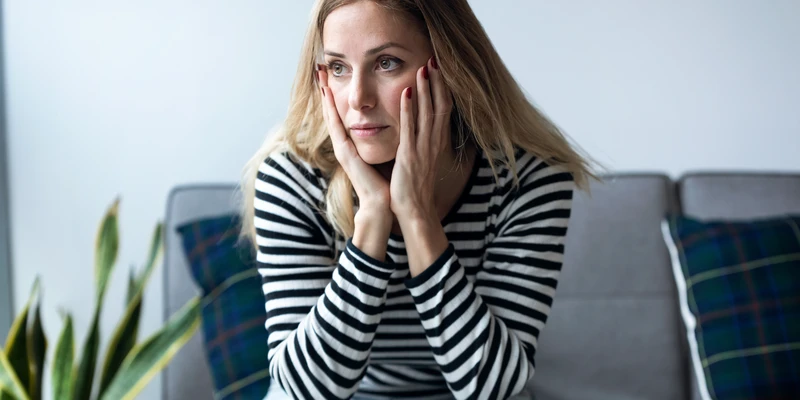- What Is Unspecified Anxiety Disorder?
- What Are the Symptoms of Unspecified Anxiety Disorder?
- Possible Causes of Unspecified Anxiety Disorder
- What Happens During an Anxiety Disorder Diagnosis?
- Unspecified Vs Specified Anxiety Disorder
- Professional Anxiety Disorder Treatment
- Tips for Managing Anxiety
- Other Types of Anxiety Disorders
- Find Help for Anxiety with Sierra Recovery

Many people around the world live with anxiety. In some cases, the symptoms of anxiety fit into a diagnosis, but sometimes, a person’s symptoms don’t match a defined category. This is called unspecified anxiety disorder.
What Is Unspecified Anxiety Disorder?
When an anxiety disorder is unspecified, this means that it doesn’t fall under the typical symptoms of a defined category. For instance, someone may feel on edge or have trouble sleeping without knowing exactly why. The lack of labels for this type of anxiety can be frustrating for those who suffer from it, and it can even undermine its effects on a person.
What Are the Symptoms of Unspecified Anxiety Disorder?
Anxiety symptoms can range from psychological to physical and behavioural. Learning about the different symptoms of this mental health disorder can help identify whether someone is struggling with it, so they can get the help they need and deserve.
Psychological Symptoms
The symptoms of anxiety typically manifest psychologically, and they usually include the following:
- Persistent worry or fear that affects daily function, even without an apparent reason.
- Racing thoughts that you can’t seem to control or “turn off”.
- Constantly feeling like something bad is going to happen.
- Feeling restlessness throughout the day and needing a distraction.
- Mood swings that usually don’t have a specific cause.
- Getting easily frustrated or irritable.
Physical Symptoms
Anxiety can also show up physically. Symptoms include:
- Increased heart rate or palpitations
- Inability to breathe or shortness of breath
- Headaches and unexplained aches
- Muscle tension, especially in the shoulders, neck, or jaw
- Constantly trembling or shaking
- Upset stomach
- Profusely sweating even when inactive or not hot
- Sleep disturbances, such as trouble falling asleep
Behavioural Symptoms
When someone lives with anxiety, they often try to cope with their actions. This means that their behaviour indicates how they respond to what they feel.
Some common behavioural signs of this condition include:
- Avoiding certain situations, places, or people that make them anxious.
- Withdrawing from social activities and peers.
- Constantly checking on things to make sure “everything is in place”.
- Struggling to start tasks because they are too overwhelming.
- Relying on harmful substances, like drugs or alcohol, to cope with anxiety.
Possible Causes of Unspecified Anxiety Disorder
While it can be difficult to pinpoint the cause of unspecified anxiety, there may still be a combination of factors that contribute to its presence. People may experience anxiety disorder due to the following:
Genetics
One possible reason for anxiety can be genetics. A family history of anxiety or other mental health conditions can mean that you are likely to experience the same condition yourself.
Some studies have shown that anxiety can be inherited, and your genes can influence how your body regulates mood-related chemicals. Learning about how genetics can play a role in the prevalence of anxiety can help lessen the blame on oneself and acknowledge that anxiety isn’t a sign of weakness.
Brain Chemistry
Different neurotransmitters are involved in anxiety disorders. These are the chemicals in the brain that regulate the way we think and feel.
When there is an imbalance in these neurotransmitters, it can affect how we react to stress and, therefore, cause anxiety. Imbalances in neurotransmitters like serotonin, dopamine, and norepinephrine can lead the brain to stay in a heightened state of alert.
Trauma
Trauma is also one of the many probable causes of anxiety. It can take many forms, such as childhood abuse, bullying, sudden loss, or accidents. Even if an experience isn’t life-threatening, it can still be traumatic.
When someone experiences trauma, they may start to feel unsafe and powerless over day-to-day situations. They may begin to interpret everyday happenings as threats and develop an anxiety disorder because of it.
Medical Conditions
For others, living with a medical condition can also affect how they feel. It can indicate that someone is suffering from medical conditions that are linked to anxiety, such as thyroid disorders, heart conditions, respiratory conditions, and more.
In addition, living with a medical condition with no known cure can also induce anxiety. Having a chronic illness can create uncertainty, fear, and a sense of loss of control, all of which can trigger anxiety.
Environmental Factors
Environmental factors can also influence someone’s probability of living with anxiety. When your conditions and environment become too stressful and unsafe, they can trigger or worsen anxiety.
For instance, those in high-stress living situations can feel constantly tense. The lack of support when someone deals with these scenarios can make it more difficult to cope and result in excessive anxiety.

What Happens During an Anxiety Disorder Diagnosis?
Typical diagnoses for anxiety disorders often start with an initial conversation with your GP or a mental health professional. This initial conversation will include conversations about your symptoms, how they feel, and how they affect your life.
Afterwards, your medical and mental health history will be thoroughly assessed. Your doctor may have a more in-depth chat with you to discuss these details, or they may ask you to fill out a questionnaire about your symptoms.
Unspecified Vs Specified Anxiety Disorder
If your symptoms do not quite match a specific anxiety disorder, like generalised anxiety disorder or panic disorder, you may be diagnosed with unspecified anxiety disorder. When your anxiety is specified, this means your symptoms follow a recognisable pattern as outlined in The Diagnostic and Statistical Manual of Mental Disorders (DSM).
On the other hand, when an anxiety disorder is unspecified, it means that your symptoms are mixed or unclear. This may not be enough information to create a more precise diagnosis, but it doesn’t mean that you have a “weaker” version of anxiety. What you’re experiencing is valid, and it just means that you may need more extensive or complex treatment for it.
Professional Anxiety Disorder Treatment
The best way to address and manage anxiety is through professional treatment. Some common treatments for anxiety disorder include:
Psychotherapy
Psychotherapy is one of the most widely used treatment options for anxiety today. Talking therapy can help you understand more about your thoughts and emotions to develop healthier ways to cope.
The most common psychotherapy used for anxiety is Cognitive Behavioural Therapy (CBT). During CBT, you’ll recognise negative or anxious thought patterns and learn how to replace them with more realistic thoughts.
Exposure therapy is also a common form of therapy used for anxiety treatment. It’s a way to gradually face your fears in a safe environment and reduce avoidance behaviours over time.
Medication
When symptoms become severe and persistent, medications can be used alongside psychotherapy. Selective Serotonin Reuptake Inhibitors (SSRIs) and Serotonin-Norepinephrine Reuptake Inhibitors (SNRIs) are usually used to help increase serotonin levels in the brain.
In some cases, benzodiazepines can also be used for anxiety treatment. However, benzodiazepine use should be closely monitored since it has a high potential for abuse and is not recommended for long-term treatment.
Rehab
Another treatment option for severe anxiety is rehab. This can benefit those who don’t find other forms of support enough to manage their symptoms. During rehab, you’ll be in a structured and immersive environment where you can focus on recovery. Rehab facilities are free from any triggers and distractions that can make healing more difficult.
Aftercare
After going to rehab, aftercare also becomes essential to maintaining your progress. Many rehab facilities offer continued therapies and assistance so that you can face any new challenges in daily life. They can also offer connections to support groups that can provide a sense of community for those who struggle with anxiety.

Tips for Managing Anxiety
Beyond professional treatment, there are various ways to manage your anxiety at home. These tips can be constructive while waiting for an accurate diagnosis and not having access to comprehensive professional services yet.
Practise Mindfulness
Practising mindfulness can help you manage your anxiety by enabling you to pay attention to the present moment. It helps interrupt anxious thought spirals and reduce physical tension by calming your nervous system.
One way to practice mindfulness is to use the 5-4-3-2-1 grounding exercise, which includes naming:
- 5 things you can see
- 4 things you can feel
- 3 things you can hear
- 2 things you can smell
- 1 thing you can taste
Engage in Relaxing Activities
When you engage in relaxing activities, you give your mind and body time to unwind. This allows you to have a space to breathe and distracts your mind from overthinking.
Some relaxing activities include gentle movement, creative endeavours, and soothing routines. Relaxation also helps improve your mood and reminds you that joy is still possible amid all the challenges.
Talk to Someone You Trust
When things get tough, having a trusted person willing to listen to your feelings can greatly help. It allows you to express yourself without fear of being judged. Sometimes, talking to someone you trust can also help remind you that you’re not alone, even if anxiety makes you feel isolated. This person can be a close friend, family member, or mental health professional.
Limit Caffeine and Alcohol
Caffeine is a stimulant, and drinking drinks with caffeine can speed up your heart rate, increase irritability, and amplify overthinking. On the other hand, alcohol can disrupt your sleep and affect your brain chemistry. It also has a high potential for abuse, and many people with anxiety become dependent on it to numb negative feelings. It’s best to cut back or even avoid these drinks to improve your mental health.
Prioritise Sleep
Prioritising sleep is also important when you’re struggling with something like anxiety. Even though it can be hard to fall asleep sometimes, sleep matters because it helps improve your emotional resilience. With better sleep, you can better handle the stress and uncertainty associated with anxiety.
Other Types of Anxiety Disorders
Aside from unspecified anxiety, other anxiety disorders can make everyday life more difficult for those who suffer from them.
Generalised Anxiety Disorder
Generalised Anxiety Disorder (GAD) is when someone suffers from persistent worry about everyday things. The symptoms of this disorder are ongoing and often last for six months or more. It’s a serious condition that makes it difficult to function every day.
Panic Disorder
Panic disorder is when someone experiences repeated, unexpected panic attacks that can be extremely terrifying. Panic attacks can make you feel like something severe is happening, and the intense discomfort often peaks within minutes.
Social Anxiety Disorder
Social anxiety disorder is when people have an overwhelming fear of social situations. Those who struggle with this condition may always feel like people are waiting for them to fail. They may also think they will embarrass themselves in public, so they avoid social interaction.
Separation Anxiety Disorder
Separation anxiety is when someone experiences extreme anxiety when they are separated from an attachment figure. It’s a kind of anxiety more prevalent in kids, often until approximately age 3. Common causes of this disorder include moving to a new location, lack of a secure emotional bond, or a loved one’s death.
Find Help for Anxiety with Sierra Recovery
If you feel like you’re constantly trapped in a cycle of worry, then you might be struggling with anxiety. Anxiety, whether unspecified or not, can seriously affect your life and relationships. Reaching out for the right help can improve your mental health and overall well-being.
Here at Sierra Recovery, we provide comprehensive treatment for those dealing with anxiety. We’re here to help you identify what may be causing your anxiety and learn practical ways to cope. With us, you can slowly build a healthier and more meaningful life.






